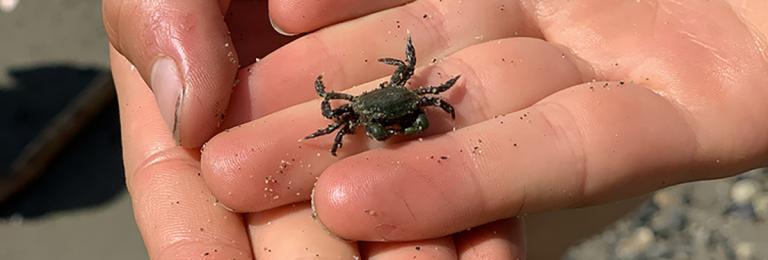Learning about Crabs
Food literacy for young children is all about understanding where our food comes from. Crab is an important source of food for many of our indigenous and marine communities here in BC.
What are crabs?
Crabs are crustaceans and they do not have skeletons like humans but instead have exoskeletons, a hard shell surrounding their body. Crabs come in all sizes from tiny rock crabs you can hold in your hand to giant spider crabs that can span 10 feet. Crabs have 4 pairs of walking legs plus two pincers they use for feeding themselves. They feed on clams, algae, small fish and other small crustaceans. Besides being eaten by humans, river and sea otters, halibut, dogfish and great blue herons also enjoy eating crab.
Why are crabs important?
Crabs are a delicacy around the world and have been eaten for as long as people have lived near the sea. For some indigenous communities in BC, crab harvesting is an important activity for eating and cultural significance. Crabs are one of the main decomposers in the marine ecosystem, meaning they help to clean up the sea bottom by harvesting decomposing plant and animal matter.
Here are some activity ideas for learning about crabs:
• Eat crab. If fresh is available, it would be fun for children to see how to crack a cooked crab and get the meat out of the claws. If not, lump crabmeat or even canned crab would also be fun to try. Just avoid imitation crabmeat which is actually white fish, like pollock, with sugar and other additives. Childcare facilities with 8+ children should check with their Licensing Officer about what is needed to serve food.
• Learn from an expert or elder. Invite a person to speak to the children who is familiar with catching crab or who may share traditional cultural knowledge about crabs. Don’t forget to show a crab trap!.
• Visit the beach. Coastal areas are abundant with all types of crabs and it can be fun for children to play with small ones or look for empty shells/exoskeletons. Crabs like to hide in rock crevices or bury themselves in the sand so go on a crab hunt all together. Please remember to leave the crabs at the beach—a license is required in BC to harvest crab.
• Play crab tag. Make a couple of people otters and the rest are crabs. Make sure to do the crab walk!
• Arts & crafts. Make your own crabs out of egg cartons and pipe cleaners.
For more ideas and resources:
